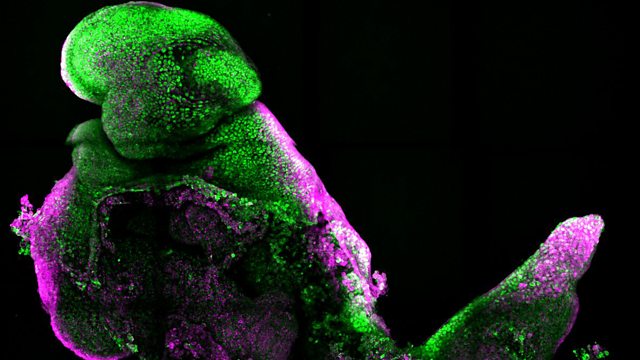Synthetic mouse embryos with brains and hearts
Researchers grow synthetic mouse embryos with brains and beating hearts from stem cells. Plus, how covid spreads when we breathe and ways to improve coronavirus vaccines.
This week two research groups announced that they have made synthetic mouse embryos that developed brains and beating hearts in the test tube, starting only with embryonic stem cells. No sperm and eggs were involved. Previously, embryos created this way have never got beyond the stage of being a tiny ball of cells. These embryos grew and developed organs through 8 days – more than a third of the way through the gestation period for a mouse. Roland Pease talks to the leader of one of the teams, developmental biologist Magdalena Zernicka-Goetz of Cambridge University and Caltech about how and why they did this, and the ethical issues around this research.
Also in the programme: the latest research on how we spread the SARS-CoV-2 virus when we breathe. Infectious disease researcher Kristen Coleman of the University of Maryland tells us about her experiments that have measured the amounts of virus in the tiny aerosol particles emanating from the airways of recently infected people. The results underscore the value of mask-wearing and effective ventilation in buildings.
We also hear about new approaches to vaccines against the virus – Kevin Ng of the Crick Institute in London talks about the possibility of a universal coronavirus vaccine based on his research, and immunologist Akiko Iwasaki of Yale University extolls the advantages of nasal vaccines against SARS-CoV-2.
From dumping raw sewage into rivers to littering the streets with our trash, humans don’t have a great track record when it comes to dealing with our waste. It’s something that CrowdScience listener and civil engineer Marc has noticed: he wonders if humans are particularly prone to messing up our surroundings, while other species are instinctively more hygienic and well-organised.
Are we, by nature, really less clean and tidy than other animals? Farming and technology have allowed us to live more densely and generate more rubbish - maybe our cleaning instincts just aren’t up to the vast quantities of waste we spew out? CrowdScience digs into the past to see if early human rubbish heaps can turn up any answers. We follow a sewer down to the River Thames to hear about The Great Stink of Victorian London; turn to ants for housekeeping inspiration; and find out how to raise hygiene standards by tapping into our feelings of disgust and our desire to follow rules.
(Image: Stem cell built mouse embryo at 8 days. Credit: Zernicka-Goetz Lab)
Last on
More episodes
Broadcasts
- Sat 6 Aug 2022 23:06GMTΒι¶ΉΤΌΕΔ World Service South Asia & East Asia only
- Sun 7 Aug 2022 00:06GMTΒι¶ΉΤΌΕΔ World Service except East Asia & South Asia
Podcast
-
![]()
Unexpected Elements
The news you know, the science you don't


